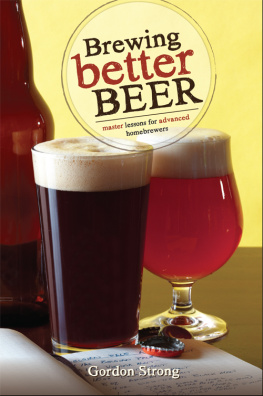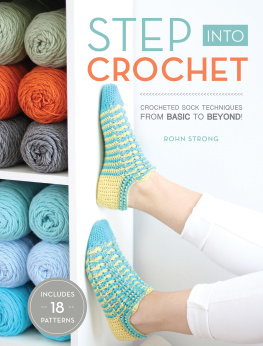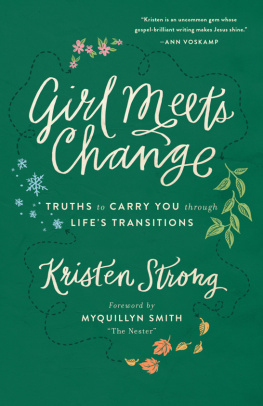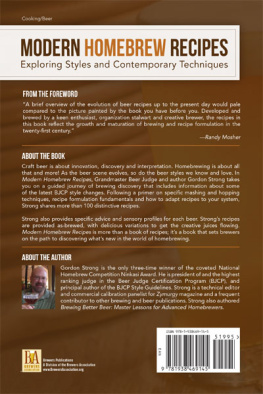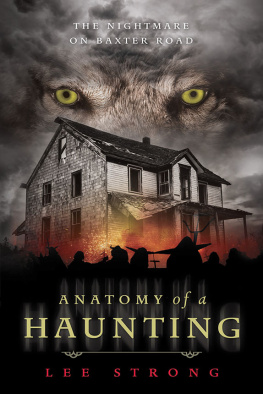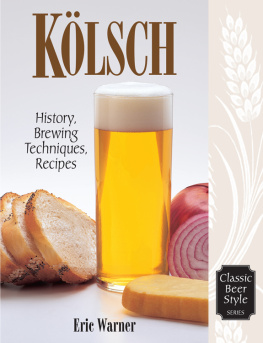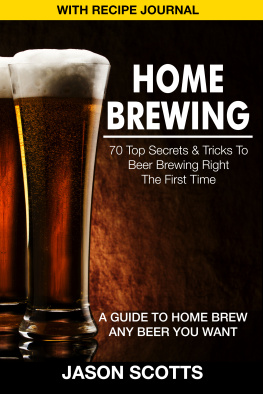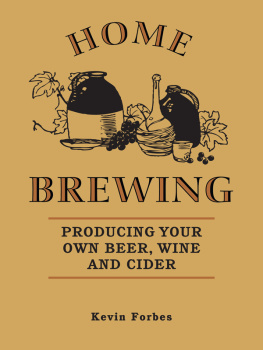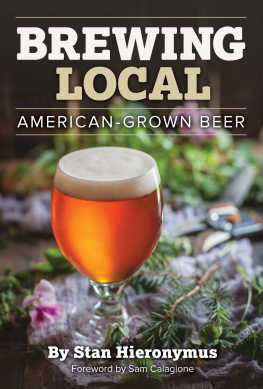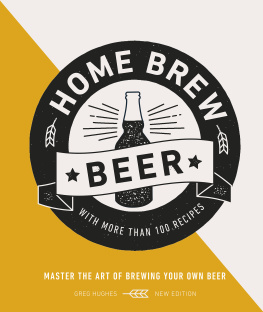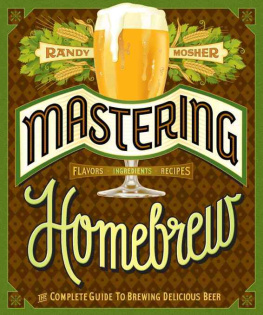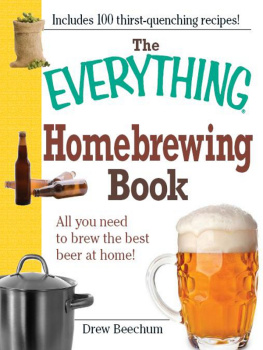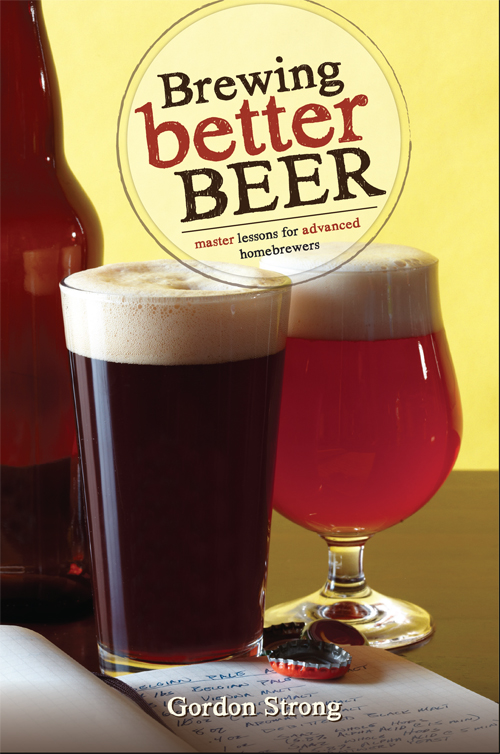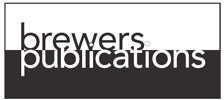All rights reserved. No portion of this book may be reproduced in any form without written permission of the publisher. Neither the authors, editor nor the publisher assume any responsibility for the use or misuse of information contained in this book.
Brewing better beer : master lessons for advanced home brewers / by Gordon Strong.
p. cm.
Includes .
1. Beer--Amateurs manuals. 2. Brewing--Amateurs manuals. I. Title.
Technical Editor: Joseph A. Formanek, Ph.D.
To Joe Frisbie and Ken Weems, who first got me interested in craft beer and homebrewing,
To my wife, Karla, and my daughter, Katya, for putting up with me ever since.
Since this book is personal and somewhat autobiographical in nature, I must thank those who have played a part in my development as a brewer. I met the people who showed me how to brew all-grain through the DRAFT homebrew club; thanks to Steve Zabarnick, Ted Holloway, Mike Boetger, and Steve Bertolo for showing me different methods and approaches. I also met two professional brewers with strong homebrewer roots, Doug Beedy and Eric Asebrook, who gave me critical early advice and support.
As I got more involved in judging and competing, I met some great brewers who are still close friendsJoe Formanek, Jamil Zainasheff, Frank Barickman, Keith Kost, and Paul Shick. Theyve always been good for swapping beers and stories, and in sharing information about brewing.
More recently, Ive learned the most from fellow members of the Saint Paul Homebrewers ClubCurt Stock, Kris England, Thomas Eibner, and Steve Fletty. These are the guys who have pushed me the most to succeed in the last few years.
Dennis Hall taught me how to properly appreciate and taste wine, which gave me skills that Ive used continuously. I also learned a great deal from technical discussions over the years with A. J. deLange, Al Korzonas, Pete Devaris, Alan McKay, Jeff Sparrow, Steve Hamburg, and Martin Brungard. Regnier de Muynck showed me much about Belgium.
I want to thank those who allowed my work to be enjoyed by a wider audience: Justin Crossley and Chad Moshier from The Brewing Network, who have had me on their shows several times, and magazine editors Jim Parker, Jill Redding, Betsy Parks, and Greg Barbera for publishing my articles.
Thanks to Joe Formanek for his technical review. Nothing helps like a second set of eyes from a fellow Ninkasi winner who also happens to be a Ph.D. food chemist. Sincere thanks go to Jamil Zainasheff, Peter Symons, and Randy Mosher, who all reviewed the draft and provided very helpful comments.
My biggest thanks go to Michael Ferguson for his heartfelt foreword. Little did I know when I suggested that he write the foreword, that I would get such a ringing endorsement from a true industry legend and brewing badass. Mufasa is well respected among homebrewers for his honest, straightforward, knowledgeable, and humorous talks, and for his inspiration to us all to advance our skills.
Finally, thanks to Kathryn Porter Drapeau for suggesting that I write this book, and to Kristi Switzer, my publisher, for her support and understanding as I wrote it. Kristi, since I like to use quotes, Ill close with one more from Douglas Adams: I love deadlines. I like the whooshing sound they make as they fly by.
There are basically two reasons to read a foreword. You have either already bought the book and are looking to get everything out of it you can, or you are contemplating buying the book and are looking for insight into whether or not you should spend the money. Forewords to books are like book reviews and often are written by an industry peer. Reading the foreword of a book is a way of preparing to read the book in question.
Well, lets just cut to the chase. For those of you who have purchased this book, you are way ahead of the game. As for the contemplators; just buy the book. You will not be disappointed.
There are plenty of how-to books out there. How to brew, how to use yeast, how to imitate classic styles; the list is quite long. Most are decent, and some are great. It is my opinion, however, that there are enough technical how-to books on the market, and Im sure more are coming.
This book, however, is not a how-to book; its a do you want to book.
Huh?
Let me explain.
The questions you need to ask yourself are: Do you want to pursue the mastery of homebrewing? Do you want to have a conversation with someone who is considered a Master at homebrewing? Do you want to gain insight into what it takes to be a Master at homebrewing? Do you want to win more awards? Do you want to know if you have what it takes? Do you want to understand the commitment it takes to go to a level that few of us ever attain?
Do you want to have a conversation with Gordon Strong?
You get the picture yet?
It probably sounds like Im talking about a self-help book. Maybe it is, in a way. Gordon has taken his life experiences and channeled them into becoming a Master at his craft, and even though my life experience is diametrically different, I found myself saying out loud: Gordon. Get out of my head. So much of what he says in this book parallels my own philosophy on brewing. The same thing will happen with most of you who have devoted your life to brewing.
Dont get me wrong; Im not saying that this book is only for those who want to become Masters or who want to devote their lives to brewing like some secret society acolyte. There is something here for everyone.
Gordon would say that this is for the experienced brewer already brewing all-grain recipes. I say that this is a book for anyone who has ever contemplated or attempted homebrewing, from the newbie looking in through the window to the professional brewer who has returned to his or her roots, not unlike what I have done.
Without hyperbole I can say this book has something for everyone. It is like the Zen and the Art of Motorcycle Maintenance for Brewing. I see the Metaphysics of Quality all throughout this book. There was a definite metaphysical shift in Gordons life experiences, which helped him understand where to focus his energy. Fortunately, we dont need a near-death experience to find this understanding. All we need to do is read this book and take the lessons learned to heart.
I remember my first attempt at homebrewing. There were no homebrew shops. There were no online stores. Hell, there was no on line! The recipe was from a high school buddy, who got it from his uncle, who used to brew various concoctions while in the military. Dry bakers yeast and lots of sugar were just two of the many ingredients that we used to make perhaps the worst alcoholic beverage ever brewed.

